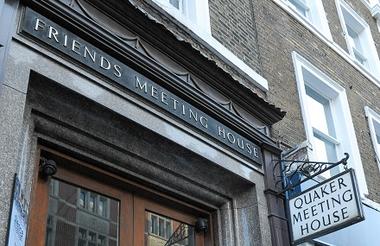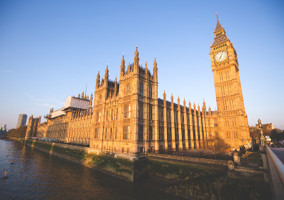A month ago, police forced entry to Westminster Quaker Meeting House, searched the building and arrested six young at a meeting of the protest group Youth Demand. One moment, they were sitting in a circle eating breadsticks and hummus while discussing how to protest the climate crisis and the war in Gaza. The next, they were taken to a distant police station and held overnight on suspicion of conspiracy to cause a public nuisance. All six were released, as yet without charge.
Since then, Quakers have had an outpouring of support, including from other faith groups nationally and internationally, climate and peace organisations, charities, members of the public, and parliamentarians from across the political spectrum. It has been very clear to us that this police action crossed a line, and it has rung alarm bells for many about the policing of protest in this country.
Recent protesting restrictions
Quakers have our own long history of persecution for our faith and activism. Whilst the Youth Demand protesters arrested in Westminster were not Quakers, these were people following their conscience, trying to hold to account a system which they felt was ignoring their concerns.
If you talk to activists in the environmental movement, this kind of policing has been going on for some time, to the extent that a recent Network for Police Monitoring report described it as “repression”.
In doing so, it echoes CIVICUS Monitor’s assessment of British civil society as “obstructed”. This classification is the result of two recent pieces of legislation: the Police, Crime, Sentencing & Courts Act 2022 and the Public Order Act 2023 which, between them, place draconian restrictions on British citizens’ right to gather, organise, protest, and express their views to those in positions of power.
They criminalise all but the most polite forms of protest, give the police and the home secretary sweeping powers to decide what constitutes “serious disruption” and have led directly to the sorts of arrests made at Westminster Quaker Meeting House in March. They also criminalise encampments, affecting not only protest camps but also undermining the traditional way of life of Gypsy, Roma and Traveller communities, who already experience considerable persecution.
Mechanisms for holding the powerful to account
Satisfyingly, the Court of Appeal last week upheld a High Court judgment that former home secretary Suella Braverman’s decision to label any “more than minor” disruption as “serious” for the purposes of anti-protest policing was unlawful. This was an appeal which the new government could have dropped, but regrettably chose not to.
These issues may sound like things which only affect the more extreme, activist constituency in British civil society. But the truth is that they are part of a pattern which has been emerging over several years and affects all of us who represent civil society in the public square.
This picture includes the Transparency of Lobbying Act 2014 (which limits civil society campaigning whilst leaving professional lobbyists largely untouched); the Elections Act 2022 (which for the first time requires voters to carry photographic ID); moves to limit access to judicial review and unjustly portray it as a means for lawyers to delay planning or asylum processes; the routine use of anti-advocacy clauses in government contracts and grant agreements (meaning charities which take government funding can’t speak up about flawed policies); and many attempts to use the charitable regulators to investigate often spurious claims about charities’ alleged misdeeds; among other things.
What all these things have in common is that they peel away long-established mechanisms for holding the powerful to account. Accountability takes many forms, from the formal mechanisms of the law and free, fair elections, to the legitimate criticisms that influence public opinion and apply political pressure, right through to the protests and nonviolent direct action which highlight to the public when something truly unacceptable is happening.
A narrow window of opportunity
If one looks at many of the big social changes we think of as progress – from the abolition of slavery to women’s suffrage and from same-sex marriage to the Paris climate agreement – all these forms of accountability have been essential in bringing about those changes. They can be uncomfortable for those in power, and for those who end up on the wrong side of history. Without dissent, there is only submission.
A society which suppresses dissent misses out on new thinking, innovative solutions, and the diverse range of views which support good policymaking. And it risks missing out on the insights it most needs to hear, from the people most affected by inequalities and injustices in how our world is arranged, whose voices just can’t cut through.
We have a narrow window of opportunity to reverse this alarming trend. No government will want to open itself to more criticism and protest just before a general election and risk looking soft. So next year’s King’s Speech opens up a narrow path to change – an opportunity to signal an openness to dissenting voices, alternative points of view and public pressure by committing parliament to the repeal of anti-protest laws.
This year’s Civil Society Covenant provides an opportunity for Whitehall to open up to partnership with, and legitimise criticism from, civil society. And a strong government would recognise that dissent is both an essential part of a healthy democracy and a necessary antidote to groupthink and siloed decision-making.
As a Quaker, I hope the raid on our meeting house serves as a wake-up call, a catalyst for the conversations we need to have about the country we want to be. We are at a fork in the road. One way leads to greater intolerance of dissent, repression and ultimately authoritarianism. The other leads to a lively, tolerant and open democratic society. That, surely, is the path our country must take now.
Paul Parker is recording clerk of Quakers in Britain
Related articles












